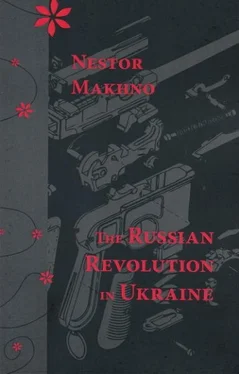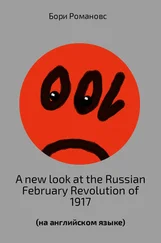Nestor Makhno - The Russian Revolution in Ukraine
Здесь есть возможность читать онлайн «Nestor Makhno - The Russian Revolution in Ukraine» весь текст электронной книги совершенно бесплатно (целиком полную версию без сокращений). В некоторых случаях можно слушать аудио, скачать через торрент в формате fb2 и присутствует краткое содержание. Город: Edmonton, Год выпуска: 2007, Издательство: Black Cat Press, Жанр: Биографии и Мемуары, на английском языке. Описание произведения, (предисловие) а так же отзывы посетителей доступны на портале библиотеки ЛибКат.
- Название:The Russian Revolution in Ukraine
- Автор:
- Издательство:Black Cat Press
- Жанр:
- Год:2007
- Город:Edmonton
- ISBN:нет данных
- Рейтинг книги:5 / 5. Голосов: 1
-
Избранное:Добавить в избранное
- Отзывы:
-
Ваша оценка:
- 100
- 1
- 2
- 3
- 4
- 5
The Russian Revolution in Ukraine: краткое содержание, описание и аннотация
Предлагаем к чтению аннотацию, описание, краткое содержание или предисловие (зависит от того, что написал сам автор книги «The Russian Revolution in Ukraine»). Если вы не нашли необходимую информацию о книге — напишите в комментариях, мы постараемся отыскать её.
The Russian Revolution in Ukraine
The Russian Revolution in Ukraine — читать онлайн бесплатно полную книгу (весь текст) целиком
Ниже представлен текст книги, разбитый по страницам. Система сохранения места последней прочитанной страницы, позволяет с удобством читать онлайн бесплатно книгу «The Russian Revolution in Ukraine», без необходимости каждый раз заново искать на чём Вы остановились. Поставьте закладку, и сможете в любой момент перейти на страницу, на которой закончили чтение.
Интервал:
Закладка:
“No, not the Revolution, just the Bolsheviks and the anarchists,” replied a voice from the group of the Ukrainian nationalist SRs, standing around their leader, sub-lieutenant Semenyuta-Riabko.
“Very well! Then be aware, gentlemen nationalists, that we anarchists will respond to your vile challenge!” declared the secretary of the Anarchist Communist Group.
With these words the meeting came to an end. The toilers of Gulyai-Pole, outraged by the threats of Semenyuta-Riabko, went home angry and insulted.
The supporters of Semenyuta-Riabko surrounded him and, encouraged by their leader’s laughter, made nasty comments to the toilers who were leaving: “Go on home! We’re going to wait for the response of the anarchists…”
Three or four hours after the meeting I submitted officially to the Revkom on behalf of the Anarchist Communist Group the following question: “How does the Revkom, as the organizer of revolutionary unity and solidarity in the work of defending the Revolution, regard the threat addressed to the anarchists by the Ukrainian nationalist organization? Does the Revkom think it ought to do something about this threat, or not?”
The Revkom studied this question the very same day and responded to the Anarchist Communist Group that it placed no political importance on the threats of the leader of the Ukrainian nationalist “socialists”, sub-lieutenant Semenyuta-Riabko, directed at the anarchists. The organization of nationalists was in essence not revolutionary, and its vacuous and irresponsible chatter could do nothing to harm the work of the Revolution.
Nevertheless, the Anarchist Communist Group did not agree with the Revkom’s position regarding the clearly counter-revolutionary threats of the nationalists and declared a second time, in a note addressed to the Revkom, that it was a mistake to tolerate opinions contrary to the principles of revolutionary solidarity. The note demanded that the Revkom publish an appeal to the population, condemning in no uncertain terms the counter-revolutionary organization of the nationalist-socialists and their threats against the anarchists and the anarchist ideal specifically.
The Anarchist Communist Group declared if the Revkom did not act in this matter, it would be obliged to recall its members from the Revkom and could no longer support it in any fashion in the future.
As I recall, several members of the Revkom asked me if I agreed with the demands of the Group and if I would submit to its decision if it recalled its members from the Revkom. I responded that the demands of the Anarchist Communist Group were justified and that, although I was not a delegate from the Group but rather from the Soviet, I intended to respect the decision of the Group and act accordingly. Then the members of the Revkom decided unanimously, without discussion, to review the two notes of the Anarchist Communist Group again and summon the leaders of the Ukrainian nationalist organization to try to smooth over the conflict which had arisen between them and the anarchists.
But it was already too late…
The Anarchist Communist Group made the Revkom aware that it had declared terror against all those who dared, now or in the future (in the case of victory of the Counter-Revolution over the Revolution), to persecute the anarchist ideal or its anonymous adherents. The first act in this campaign was the execution of Semenyuta-Riabko, an act which had already been carried out by members of the Group.
Actually, Semenyuta-Riabko had been killed around the same time the Anarchist Communist Group made its declaration to the Revkom. The Group had not received a timely answer from the Revkom to their second note and took matters into its own hands. The news of this execution made a very strong impression on the Revkom. Its members were shook up — they could neither act nor speak and appeared completely stunned as the representatives of the Group calmly dealt with current business.
The next day, around 10 a.m., a delegation from the organization of Ukrainian nationalists arrived at the Revkom and consulted with me, requesting my intervention in the conflict between their Ukrainian Organization (UO) (they didn’t call themselves nationalists) and the Anarchist Communist Group.
When I passed this information on to the members of the Revkom, they totally refused to examine this affair, declaring that Semenyuta-Riabko, dazzled by the success of the counter-revolutionary Austro-German armies, lost his senses which prevented him from understanding that the Revolution was not yet beaten and was still capable of striking back at its enemies.
Threatening the anarchists with the arrival of counter-revolutionary troops and prison was a flagrant act of injustice towards the Revolution, the Revolution which almost the entire population supported. The killing of the person who made this threat and boasted of a Counter-Revolution supported by the bayonets of the emperors’ armies and the Central Rada, was an act in defence of the Revolution.
But it came too late. The anarchists should have killed him the moment this counter-revolutionary had threatened them in saying that as soon as his German and Austro-Hungarian friends showed up, he would make it his business to see that the anarchists were locked up.
“Since the leader of the Ukrainian nationalist organization was an enemy of the Revolution,” declared the members of the Revkom, “we consider it quite inadmissible to concern ourselves with this incident and to have it mentioned in the minutes of our meetings.
With the knowledge and approval of his organization, sub-lieutenant Semenyuta-Riabko uttered a vicious threat against the anarchists; it thus belongs to this organization to straighten out this matter, to withdraw the threat and carefully redefine its socio-political position with regard to the Revolution. Only then can the UO be admitted to the Revkom and avoid similar conflicts in the future.”
The delegation left the Revkom and returned to its comrades, bearing the censure of the Revokom against the whole UO.
I must say that personally I did not approve of this response, but I couldn’t protest while the delegation was present. Only after it had left did I affirm once more that the Revkom stood for revolutionary unity and solidarity. As such it should be prepared to enter into negotiations with organizations which requested its intervention in cases where errors of judgement had occurred, errors which could provoke conflicts like the one created by the UO which had led to the death of its leader.
Already when the Anarchist Communist Group first approached the Revkom about the threat against the anarchists, I had said that it was necessary to intervene in this conflict. But the majority of members of the Revkom had objected, claiming that if the Revkom stayed out it the whole thing would blow over and be forgotten.
Now I repeated again: if the Revkom had reacted right away to my desire to maintain the revolutionary honour of the Group of which I was a member, the Group which had close ideological ties with the Revkom in the defence and development of the Revolution, it is entirely possible that the Group would not have killed the agent of the counter-revolutionary Central Rada.
“It’s true that it’s too late to do anything now,” I said to my comrades on the Revkom, “but it’s not too late to act to avoid retaliatory assassinations on the part of the nationalists which — I must declare it openly — will unleash terror against all those who — consciously or just through stupidity — have become agents of the dirty work of the Central Rada and its German allies.”
At this same meeting, the Revkom designated three of its members: Moise Kalinichenko, Paul Sokruta, and myself, who were to form a commission with the nationalists to find a way to avoid killings by either side.
Читать дальшеИнтервал:
Закладка:
Похожие книги на «The Russian Revolution in Ukraine»
Представляем Вашему вниманию похожие книги на «The Russian Revolution in Ukraine» списком для выбора. Мы отобрали схожую по названию и смыслу литературу в надежде предоставить читателям больше вариантов отыскать новые, интересные, ещё непрочитанные произведения.
Обсуждение, отзывы о книге «The Russian Revolution in Ukraine» и просто собственные мнения читателей. Оставьте ваши комментарии, напишите, что Вы думаете о произведении, его смысле или главных героях. Укажите что конкретно понравилось, а что нет, и почему Вы так считаете.












